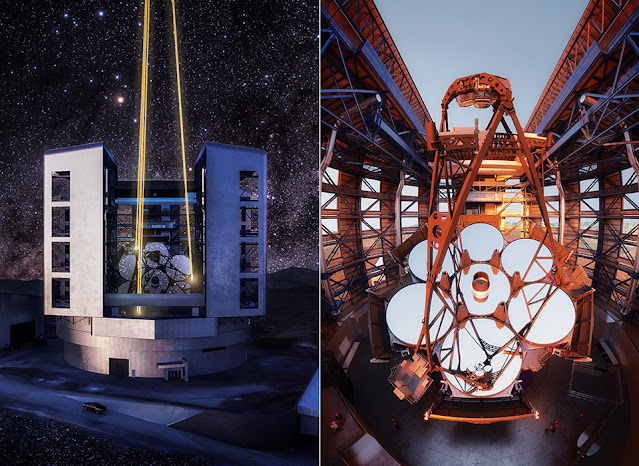A new $205 million cash infusion has been received for the Giant Magellan Telescope, the most potent telescope ever designed. This money will be utilised to speed up construction. It will have four times the power of the James Webb Space Telescope once it is complete.
The money, which will be used to build the enormous 12-story telescope building that will be housed at the Las Campanas Observatory in Chile's Atacama Desert, is said to be one of the greatest funding rounds for the telescope since its creation.
When finished, the Giant Magellan Telescope will have ten times the light collecting area and four times the spatial resolution of the James Webb Space Telescope (10 times the resolution of the Hubble Space Telescope).
It will also be 200 times more powerful than any current existing research telescope. While no firm date for its completion has been noted, commissioning is expected to begin in the late 2020s, and this latest cash infusion will certainly go a long way to making that goal a reality.
The GMTO says that the construction of the telescope has already achieved significant progress over the last few years.
“Six of seven primary mirror segments have been cast in Tucson, Arizona. The third primary mirror segment has completed its two-year polishing phase and is undergoing final testing. Construction of a 40,000-square-foot facility in Rockford, Illinois to manufacture the telescope structure is complete. The production of the telescope’s first adaptive secondary mirror is well underway in France and Italy, and the site in Chile is primed for the next stage of construction and pouring of the foundation,” the GMTO says.
“This latest $205 million investment round positions the Giant Magellan Telescope to be one of the first in a new generation of extremely large telescopes to be constructed. First light is anticipated by the end of the decade.”
The Giant Magellan Telescope is regarded as the space exploration of the future. The James Webb Space Telescope (JWST), which recently wowed the world with its astounding resolution, will be outclassed by this telescope, which will use seven of the largest mirrors in the world to create the most detailed images of the Universe ever captured. The 25.4-meter primary mirror array is made up of seven mirrors with an 8.4-meter diameter and weighs 18 metric tonnes. However, the Giant Magellan Telescope will advance things.
The 368 square metre total light collection area will provide images crisp enough to distinguish the torch carved on a dime from over 99 miles (160 kilometres) away. The telescope mount is 65 metres long, 39 metres tall, and 2,100 tonnes in weight. It can rotate completely in less than three minutes. With the greatest field of view of any telescope, seven adaptive secondary mirrors may reconfigure the two millimeter-thick surface 2,000 times per second to compensate for the optical blurring impact of the Earth's atmosphere.
In short, the telescope is set to be a marvel of technology and set a new pinnacle for space observation.
“This unprecedented angular resolution, combined with revolutionary spectrographs and high contrast cameras, will work in direct synergy with JWST to empower new scientific discoveries,” the GMTO says.
Image credits: Giant Magellan Telescope — GMTO Corporation

















No comments